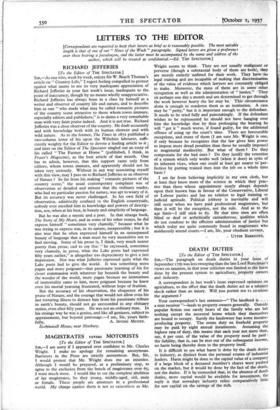MAGISTRATES versus MOTORISTS [To the Editor of THE SPECTATOR.]
StR,—I am sorry if I appeared over confident to Mr. Charles Wright. I make no apology for remaining anonymous. Barristers in the Press are strictly anonymous. But, Sir, I would protest that Mr. Wright does me an injustice. Although I would be prepared, as a preliminary step, to agree to the exclusion from the bench of magistrates over 65, I want much more. I would like to see the complete abolition of lay magistrates, be they young, middle-aged, old, male or female. These people are amateurs in a .professional world. My charge against them is not so censorious as Mr. Wright seems to think. They are not usually malignant or perverse (though a substantial body of them are both), they are merely entirely unfitted for their work. They have no legal training and are incapable of making that discrimination of the value of evidence which lawyers are constantly obliged to make. Moreover, the mass of them are in some other occupation as well as the administration of " justice." They sit perhaps one day a month and are determined to get through the work however heavy the list may be." This circumstance alone is enough to condemn them as an institution. A case may be " petty," but it is important enough to the defendant. It needs to be tried fully and painstakingly. If the defendant wishes to be represented h6 should not have hanging over him the knowledge that by thus prolonging the hearing he will " get it " much worse, if found guilty, for the additional offence of using up the court's time. There are honourable exceptions, and many of them (I am sure Mr. Wright is one, if only because he recognises that the law gives him power to impose more dread penalties than those he usually imposes) to magisterial mediocrity. But what of them ? Do they compensate for the bad ones ? Do they justify the retention of a system which only works well (when it does) in spite of its inherent vices, when one could at least get nearer to per- fection by putting trained men into the job on a whole time basis ?
I am far from believing implicitly in my own cloth, but at least they know more of the science in which they prac- tice than those whose appointment nearly always depends upon their known bias in favour of the Conservative, Liberal or Labour parties and has no relation to legal training or judicial aptitude. Political jobbery is inevitable and will still occur when we have paid professional magistrates, but then it will be the exception, not the rule. And as to the age limit—I still stick to 65. By that time men are often blind or deaf or arthritically cantankerous, qualities which do not condone to the efficient administration of justice but which today are quite commonly found in magistrates who assiduously attend courts.—I am, Sir, your obedient servant,
UTTER BARRISTER.






































 Previous page
Previous page